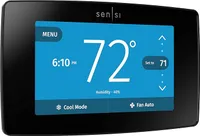Should You Leave Your Heat on All Day or Turn It Off? Which is Cheaper?
We'll show you which option helps keep you comfortable and save money on your energy bills.

Profit and prosper with the best of Kiplinger's advice on investing, taxes, retirement, personal finance and much more. Delivered daily. Enter your email in the box and click Sign Me Up.
You are now subscribed
Your newsletter sign-up was successful
Want to add more newsletters?

Delivered daily
Kiplinger Today
Profit and prosper with the best of Kiplinger's advice on investing, taxes, retirement, personal finance and much more delivered daily. Smart money moves start here.

Sent five days a week
Kiplinger A Step Ahead
Get practical help to make better financial decisions in your everyday life, from spending to savings on top deals.

Delivered daily
Kiplinger Closing Bell
Get today's biggest financial and investing headlines delivered to your inbox every day the U.S. stock market is open.

Sent twice a week
Kiplinger Adviser Intel
Financial pros across the country share best practices and fresh tactics to preserve and grow your wealth.

Delivered weekly
Kiplinger Tax Tips
Trim your federal and state tax bills with practical tax-planning and tax-cutting strategies.

Sent twice a week
Kiplinger Retirement Tips
Your twice-a-week guide to planning and enjoying a financially secure and richly rewarding retirement

Sent bimonthly.
Kiplinger Adviser Angle
Insights for advisers, wealth managers and other financial professionals.

Sent twice a week
Kiplinger Investing Weekly
Your twice-a-week roundup of promising stocks, funds, companies and industries you should consider, ones you should avoid, and why.

Sent weekly for six weeks
Kiplinger Invest for Retirement
Your step-by-step six-part series on how to invest for retirement, from devising a successful strategy to exactly which investments to choose.
The U.S. Energy Information Administration projects winter natural gas costs to be around the same rates as last year. That said, electricity bills are continually increasing, rising on average 5.5% year over year due to increased drilling, data centers and weather variances forcing homes to consume more energy.
There's one easy way to slash your bills: Set your thermostat to the best temperature for the appropriate amount of time. To save money on heating, the Department of Energy recommends turning your thermostat from 68°F to 70°F while you're awake and 7-10 degrees lower when you're away from home.
Doing this can help you save up to 10% annually on your energy bills. Along with this, we'll explain whether it's efficient to turn your heat off and other energy-saving measures you should employ.
From just $107.88 $24.99 for Kiplinger Personal Finance
Become a smarter, better informed investor. Subscribe from just $107.88 $24.99, plus get up to 4 Special Issues

Sign up for Kiplinger’s Free Newsletters
Profit and prosper with the best of expert advice on investing, taxes, retirement, personal finance and more - straight to your e-mail.
Profit and prosper with the best of expert advice - straight to your e-mail.
Will turning my heat off help with energy efficiency?
You may be wondering, however, if you’d be better off turning your heat off completely. In most cases, you’d be better off turning your heat down low than turning it off entirely.
According to Wired, leaving your heat running constantly at a low temperature is best. However, they warn that keeping specific rooms in your home very cold can “reduce the overall efficiency of your heating since those rooms will soak up warmth and make your boiler or heat pump work harder.”
Plus, if you live somewhere cold, turning the heat off all day probably isn’t suitable as it can cause your pipes to freeze and burst. Or maybe you work from home. Whatever the case, dropping your thermostat instead of turning it off completely can help significantly reduce your heating costs — in some cases by 10%. You'll also maximize your savings by ensuring your home is properly insulated and loses less heat.
Purchasing a smart thermostat is a great solution for keeping your home at the appropriate temperature. With a smart thermostat, you’ll be able to control your home’s temperature conveniently from your phone. This allows you to schedule different temperatures for different times of the day or to shut your heat off/on whenever you want, even if you're not at home.
Emerson Sensi Touch Wi-Fi Smart Thermostat
Smart thermostats allow you to control your temperature, whether you're on the couch or hundreds of miles away, saving you energy and keeping your home comfy.
Other ways to save on energy costs
- Do an energy audit — by making improvements identified in a home energy audit, you can save between 5% and 30% on your monthly energy bill. Tax credits for energy-efficient home improvements include the Energy Efficient Home Improvement Credit, which is equal to 30% of the costs for all eligible home improvements made during the year, and the High-Efficiency Electric Home Rebate Program, which offers $1,600 for insulation, air sealing, and ventilation. However, you should act fast, as the Energy Efficient Home Improvement Credit expires on December 31, 2025.
- Ensure your home has proper insulation, so it doesn't lose heat.
- Consider a heat pump for heating and cooling your home. A recent National Renewable Energy Lab (NREL) study found that heat pumps would lower energy bills for most Americans (62% to 95% of households, depending upon heat pump efficiency).
- Switch to LED lightbulbs — they use 75% less energy than incandescent/halogen lightbulbs.
- Consider whether solar panels could be an option for your property.
- Place your thermostat on an interior wall in a central area of your home for the best reading.
- If you live in a state with deregulated electricity, shop energy suppliers to find the lowest rates near you.
- Wash your clothes in cold water — this can cut your energy usage in half when doing laundry.
- Bundle up — wear warm clothes and use blankets to avoid turning up the heat.
- Use your dishwasher. Not only will washing your dishes in the dishwasher save you more time than handwashing them, but it'll also use less water and save energy. Overall, you'll save money by using the dishwasher vs. washing by hand.
Bottom line on whether you should keep your heat on all day
Overall, keeping your heat set to 68°F to 70°F during the day, and 7°F to 10°F lower when you're not home, is the best way to save on heating costs. Purchasing a smart thermostat gives you the option of controlling the heat in your home conveniently from your phone, helping you to save money on utility bills during cold spells.
Related content
Profit and prosper with the best of Kiplinger's advice on investing, taxes, retirement, personal finance and much more. Delivered daily. Enter your email in the box and click Sign Me Up.

Erin pairs personal experience with research and is passionate about sharing personal finance advice with others. Previously, she was a freelancer focusing on the credit card side of finance, but has branched out since then to cover other aspects of personal finance. Erin is well-versed in traditional media with reporting, interviewing and research, as well as using graphic design and video and audio storytelling to share with her readers.
-
 Quiz: Do You Know How to Avoid the "Medigap Trap?"
Quiz: Do You Know How to Avoid the "Medigap Trap?"Quiz Test your basic knowledge of the "Medigap Trap" in our quick quiz.
-
 5 Top Tax-Efficient Mutual Funds for Smarter Investing
5 Top Tax-Efficient Mutual Funds for Smarter InvestingMutual funds are many things, but "tax-friendly" usually isn't one of them. These are the exceptions.
-
 AI Sparks Existential Crisis for Software Stocks
AI Sparks Existential Crisis for Software StocksThe Kiplinger Letter Fears that SaaS subscription software could be rendered obsolete by artificial intelligence make investors jittery.
-
 One of the Most Powerful Wealth-Building Moves a Woman Can Make: A Midcareer Pivot
One of the Most Powerful Wealth-Building Moves a Woman Can Make: A Midcareer PivotIf it feels like you can't sustain what you're doing for the next 20 years, it's time for an honest look at what's draining you and what energizes you.
-
 I'm a Wealth Adviser Obsessed With Mahjong: Here Are 8 Ways It Can Teach Us How to Manage Our Money
I'm a Wealth Adviser Obsessed With Mahjong: Here Are 8 Ways It Can Teach Us How to Manage Our MoneyThis increasingly popular Chinese game can teach us not only how to help manage our money but also how important it is to connect with other people.
-
 Looking for a Financial Book That Won't Put Your Young Adult to Sleep? This One Makes 'Cents'
Looking for a Financial Book That Won't Put Your Young Adult to Sleep? This One Makes 'Cents'"Wealth Your Way" by Cosmo DeStefano offers a highly accessible guide for young adults and their parents on building wealth through simple, consistent habits.
-
 My Spouse and I Are Saving Money for a Down Payment on a House. Which Savings Account is the Best Way to Reach Our Goal?
My Spouse and I Are Saving Money for a Down Payment on a House. Which Savings Account is the Best Way to Reach Our Goal?Learn how timing matters when it comes to choosing the right account.
-
 We're 78 and Want to Use Our 2026 RMD to Treat Our Kids and Grandkids to a Vacation. How Should We Approach This?
We're 78 and Want to Use Our 2026 RMD to Treat Our Kids and Grandkids to a Vacation. How Should We Approach This?An extended family vacation can be a fun and bonding experience if planned well. Here are tips from travel experts.
-
 Why Most Millionaires Don't Feel Wealthy — and What It Really Takes to Feel Financially Secure
Why Most Millionaires Don't Feel Wealthy — and What It Really Takes to Feel Financially SecureA growing share of Americans reach millionaire status yet still worry about money. Here's why wealth feels different today and how to build true financial confidence.
-
 You Could Be Overpaying for Internet. Here’s How to Choose the Right Type
You Could Be Overpaying for Internet. Here’s How to Choose the Right TypeFiber, cable, 5G wireless and satellite internet all offer different speeds, reliability and price points. Understanding the differences could help you lower your monthly bill or improve performance.
-
 My First $1 Million: Retired From Real Estate, 75, San Francisco
My First $1 Million: Retired From Real Estate, 75, San FranciscoEver wonder how someone who's made a million dollars or more did it? Kiplinger's My First $1 Million series uncovers the answers.
